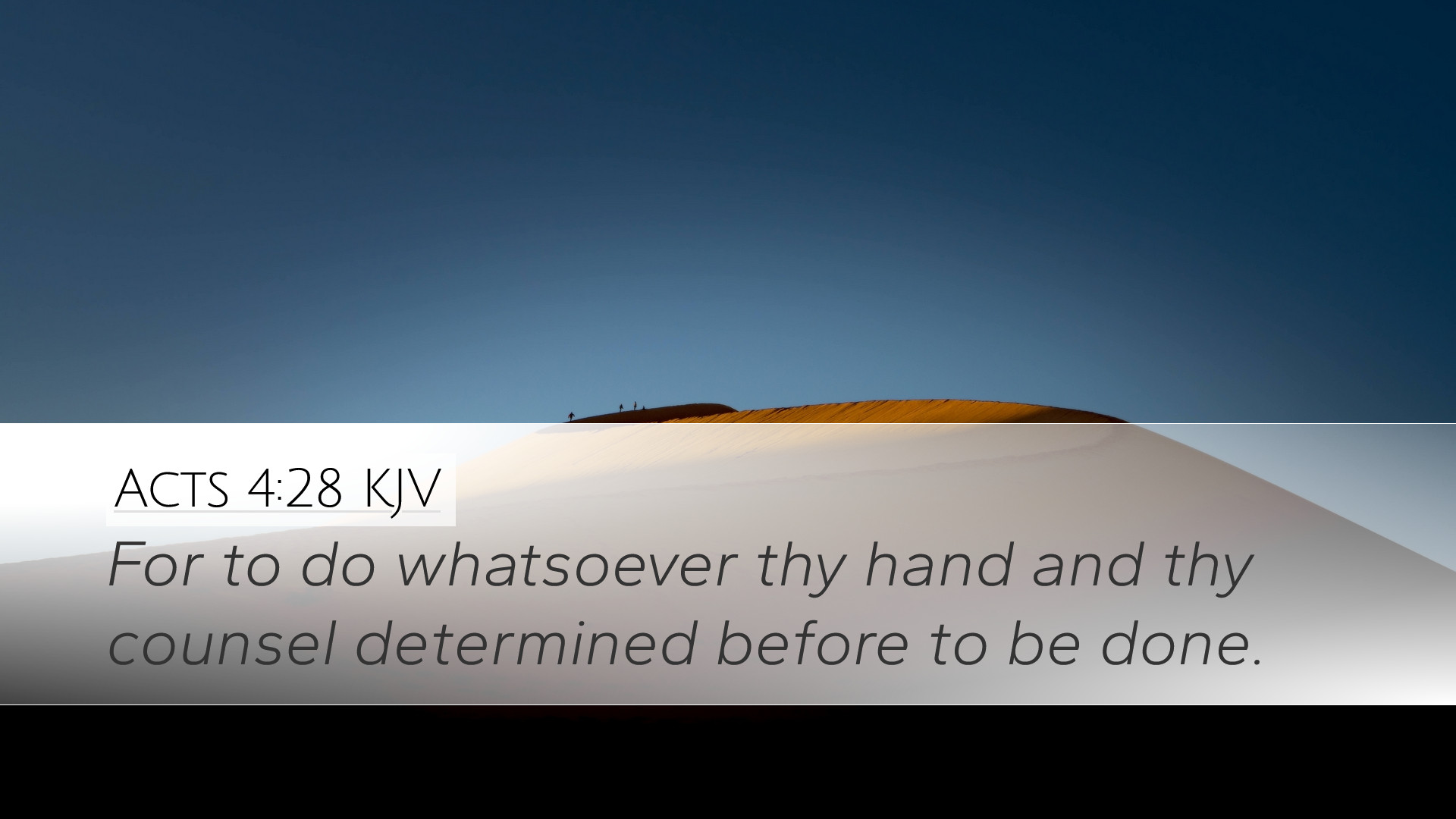Commentary on Acts 4:28
Verse (Acts 4:28): "To do whatsoever thy hand and thy counsel determined before to be done."
Introduction
The context of Acts 4:28 occurs after the apostles Peter and John have been released from captivity following their healing of the lame man at the temple gate and their subsequent preaching of the Gospel. This verse captures a pivotal moment in the early church's understanding of God's sovereignty and the unfolding of His divine plan.
The Sovereignty of God
In this verse, the early followers of Christ acknowledge the sovereignty of God concerning the events surrounding Jesus’ crucifixion. Matthew Henry notes that this recognition of God’s control over all things instills a sense of reassurance among believers. It signifies that despite the actions of wicked men, God's will is ultimately fulfilled.
Divine Determination
Albert Barnes emphasizes that the phrase "thy hand and thy counsel" indicates both God's power and His wisdom. This duality encapsulates how God's plans are executed through His mighty hand, while His counsel reflects divine wisdom. This distinction not only reassures believers of God’s omnipotence but also illustrates His deliberate and intentional guidance throughout history.
Understanding Evil Actions Within God’s Plan
Acts 4:28 implies that even the wicked actions of men—such as the plot against Jesus—were not outside of God's sovereign plan. Adam Clarke provides extensive insights on the theological implications of this truth, explaining that God's omniscience encompasses all human decisions, leading even the most sinister acts toward providential outcomes.
Historical Context
The early apostles are reflecting on prophecies like those found in Psalm 2, where nations rage against the Lord's anointed. This understanding affirms the belief that opposition to God—and by extension, opposition to His church and its mission—is not a surprise to God but is woven into the fabric of His divine narrative. Clarke notes that such awareness should empower the church, reminding them that trials are foreseen by God.
Encouragement for Believers
This verse serves as a significant source of comfort and encouragement for believers facing persecution. In light of their struggles, the early church prays not for the removal of their challenges but for boldness to proclaim the Gospel despite opposition. This request reflects their understanding of God’s purposes working through adversity.
The Role of Prayer
Henry points out that prayer is a vital resource for believers who find themselves in similar predicaments. The early church’s reliance on prayer signifies its role as a means of aligning oneself with God’s will. By acknowledging divine sovereignty in prayer, they affirm their belief that nothing can thwart God’s ordained plans.
Theological Reflections
This verse raises profound theological reflections on predestination and human free will. The balance between divine sovereignty and human responsibility is a theme highlighted by Barnes, who argues that God's predetermination does not diminish the culpability of those who acted against Christ. Rather, it underscores the harmony between God's foreknowledge and man's moral decisions.
Application for Today’s Church
In contemporary contexts, this passage encourages Christians to trust in God’s overarching plan amid trials. The acknowledgment of God’s control offers hope, especially in increasingly tumultuous societal conditions where faith is often challenged. The message of boldness in witness, seeking the strength to advance despite opposition, remains critically relevant.
Conclusion
Acts 4:28 serves as a seminal text for grasping the complexities of divine sovereignty in conjunction with human actions. It powerfully reminds believers of God’s ultimate authority and the assurance that His purposes will invariably come to fruition. As the church today continues to navigate challenges, the insights from this verse encourage faithfulness, resilience, and prayerful dependence on God.


